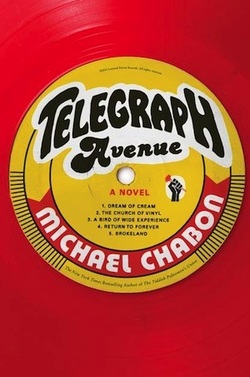
Author: Michael Chabon
# pages: 465
Date published: 2012
5-star rating: 3 out of 5 stars
Would you recommend it: Yes
In the half-forgotten world of used vinyl, Brokeland Records is a hub for classic songs, obscure titles, and memorable melodies. The shop is a haven for its owners, Archy Stallings and Nat Jaffe, and has become a staple in the quirky Brokeland community. Not only are Archy and Nat business partners, but good friends as well. Their wives, Gwen Shanks and Aviva Roth-Jaffe, also work together as well-known midwives in the community. Both couples learn the challenges that come with mixing their personal and professional lives, as each pair realizes the growing disparities in their professional ideals and personal ambitions.
When Brokeland Records faces a possible overthrow by a modern chain store, Archy and Nat are divided by the differing extents to which they want to fight for their retro refuge. Aviva and Gwen also discover tension in their relationship when a doctor directs a racist comment toward Gwen, and the scene quickly escalates to an intense verbal exchange between the hospital doctor and midwife. The confrontation then threatens to ruin Gwen and Aviva’s accreditation as midwives, and Gwen must decide what is more important to her: the practice or her values. Matters intensify when fourteen-year-old Titus arrives in Brokeland to steal Nat’s son’s heart and remind Archy about the past he chose to neglect. Needless to say, Telegraph Avenue does not skimp on complicated life decisions and complex relationships.
While the novel conveys the myriad tensions that arise from love, race, marriage, economic pressure, and life itself, the various plotlines and motifs, at times, feel underdeveloped and unresolved. Furthermore, the abundance of obscure music, comic book, and film references can leave readers who do not share those passions feeling excluded. The sheer number of allusions, when paired with the length of the novel, would sway even the most ambitious reader from looking up every arcane detail, and therefore it is sometimes difficult to find a foothold. Still, there are moments of profundity in Telegraph Avenue, and those moments are especially poignant because they effectively address real, universal concerns. It is for those moments that readers should explore Chabon’s novel and ruminate about the issues he addresses and why it is that, despite the novel’s length, he must leave them unresolved.
Review by Lauren Bly, A&S '15

 RSS Feed
RSS Feed
